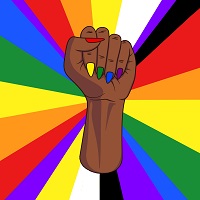Organization > Call for proposals (Symposium)
Queering Blackness: Non-Binary Black Representations in Post-Obama Popular Cultures
Call for Proposals
Queer, fluid, gender-queer, nonconforming, gray, neutrois, agender, non-binary, pan… new words, reclaimed and coined, contend to name the rejection of the U.S. social norms that so widely influence the world. Yet, within U.S. society, does this very rejection also assume normative, disproportionally racialized, class-marked trends? Or does it fundamentally spring from its most oppressed populations, both highly vulnerable and decisively combative?
Such questions are inseparable from the theoretical and activist backdrop of the long fight for Civil Rights in the United States. Divisive times have seen the election of the first black president of a nation that, only fifty years earlier, separated its population based on race, followed by the #BlackLivesMatter movement launched in 2013, only to roll into the Trump era and through a highly unequal pandemic. What does it mean that a non-White body, falsely accused of being born abroad, who shares his middle name with the 1990s foreign public enemy, rules from the whitest of houses? What influence has Obama’s position had when, along with his African American heteronormative family, he had to hand the keys over to his greatest critic? Flanked by his Slovenian-born third wife, Trump was a defender of America’s nostalgia for the “good old times,” and the proud patriarch of multiple families. Are the cards of WASP cisgender heteronormativity now randomly positioned in a house whose balance no more depends on mandatory normative criteria? Or, on the contrary, do they retain their power as trump cards of a game on constant replay? Popular cultures reflect these key questions and offer new models without necessarily having the power or the will to counter well-established stereotypes of African American hyper-virility and/or hyper-sexuality, sometimes underlined by their very disavowal.
For this one-day symposium organized by TransCrit at the University of Paris 8, we welcome papers about the representations of Black identities that have challenged binaries and their intersectional expansions within African American popular cultures—music, images, graphics, and games—since 2008. Without suggesting that rejecting binaries is an invention of the 21st century, nor that people of African descent have not fairly contributed their share to the process, we wish to explore how such phenomena have been reflected in popular rather than marginalized cultures and how they have attracted mainstream interest for representations made invisible for so long.
Proposals, in English or French (title + 500 words + corpus or bibliographical sources), and a short bio must be sent before April 30, 2022 jointly to: anne.cremieux@univ-paris8.fr and yannick.blec@univ-paris8.fr. A response will follow by June 2022.
Ph.D. candidates without research funds to support their travel can send their resume and a cover letter to apply for funding of a train ticket within France (or similar fee).
| Online user: 2 | Privacy |

|

